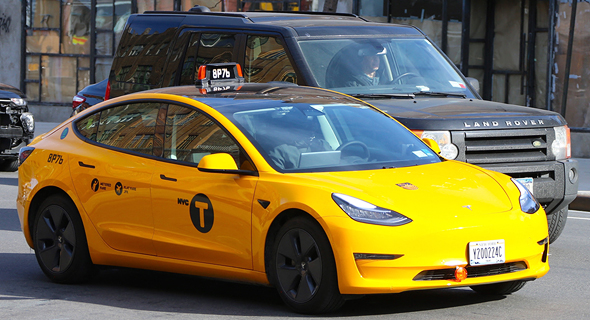
The Tesla taxi you ordered will not arrive soon: Tesla Israel refuses to sell its electric cars for use as a taxi in Israel, even though their range makes them very suitable for the task, with advantages in the ongoing costs for taxi drivers, and reducing air pollution in cities.
Read more in Calcalist:
The company, which currently coordinates its sales through its website, does not offer the option of purchasing as a taxi, which is exempt from paying purchase taxes, and whose drivers receive a refund of the VAT they have paid. The company’s call center is not available to help.
“Tesla promises a range of more than 400 km, which is already enough for my daily driving, without me having to waste time searching for a charging station in the middle of the day,” a veteran taxi driver said this week. “But I can not reach them to make a reservation.”
 Yellow electric taxi from Telsa Photo: Reuters
Yellow electric taxi from Telsa Photo: Reuters
The Tesla Model 3, which costs a private person NIS 180,000, will cost the taxi driver NIS 144,000 less taxes. This is a price about NIS 40,000 higher than a popular taxi like the Skoda Octavia Diesel, but the tram should offer significantly cheaper current costs, mainly savings of thousands of shekels a month in fuel costs, and significant savings in garage maintenance costs.
Most taxis in the country are sold through agents who specialize in this and hold exclusivity agreements with car importers. Tesla Israel has not yet contracted with any of them, although it works with outside contractors in other areas such as installation of charging stations (Afcon), body shops (ambassador), insurance (Phoenix) and financing (direct financing).
It should be noted that in the world, and also in Israel, the authorities are currently trying to encourage taxi drivers to abandon the diesel taxi, whose engines suffer from relatively high emission rates of gases and particles that are dangerous to humans. In 2019, the Ministry of Environmental Protection, funded by the JNF, implemented a subsidy program for drivers who would purchase hybrid taxis. Toyota won the tender to operate it, and the number of taxis it sold jumped three times that year to about 800 units. Regulators in the Ministry of Transport.
Tesla’s yellow taxis are already operating in New York, as are London, Barcelona and Amsterdam. However, the operation of a fleet of about 70 taxis at Schiphol Airport last December led to a lawsuit by the taxi company BIOS working in the field against Tesla, for a total of 1.3 million euros.
The company claimed that the Model S models they initially operated failed to meet the 400km range between charges. Replacing them with Model X models solved the range problem, but not various malfunctions, the handling of which was delayed because Tesla limited the company to handling only two of its taxis at a time. In addition, Tesla refused to give taxis a longer warranty than it gives to a private car, so that even after 80,000 km, the taxi company had to finance repairs totaling 150,000 euros.
Tesla said that the company currently prefers to focus in Israel on sales to the private market only, and will examine the expansion of sales in the future.